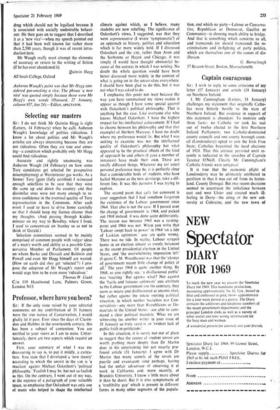Professor, where have you been?
Sir: If the only issue raised by your editorial comments on my contribution of 31 January were the true nature of Conservatism, I would gladly let it pass. Ever since the days of Claren- don and Hobbes in the seventeenth century. this has been a subject of contention. You are entitled to your views as I am to mine. Unfor- tunately, there are two aspects which require an answer.
First. your summary of what I was en- deavouring to say is, to put it mildly, a carica- ture. You state that I developed a 'new theory' according to which the unrest in the LSE is 'a reaction' against Michael Oakeshotes 'political philosophy.' Foolish I may be, but not so foolish as this. On the contrary, I went out of my way, at the expense of a paragraph of your valuable space, to emphasise that Oakeshott was only one of many who helped to shape the intellectual
climate against which, as I believe, many students are now rebelling. The significance of
Oakeshott's views, I suggested, was that they were representative (I wrote 'symptomatic') of an approach to history, politics and education which is far more widely held. If I discussed Oakeshott and the LSE, rather than Aron and the Sorbonne or Hayek and Chicago, it was simply (I would have thought obviously) be- cause of the context in which I was writing. No doubt the whole question would have been better discussed more widely in the context of what is going on in the universities everywhere. I should have been glad to do this, but it was not what I was asked to do.
I emphasise this point not least because the way you have summarised my views makes it appear as though I have some special quarrel with Oakeshott's political philosophy. That is anything but the case. Like everyone else who knows Michael Oakeshott, 1 have the highest respect for his intellectual achievement. If I had to choose between his philosophy and that (for example) of Herbert Marcuse, I have no doubt where my preference would lie. But what I was seeking to examine was not the intellectual quality of Oakeshott's philosophy but what appeared to be the practical effects of the kind of approach he and others (I gave a number of instances) have made their own. These are totally different things. Whatever my (or your) personal preference may be, it is perfectly clear that a considerable body of students, who have hailed Marcuse as the new demiurge. take a dif- ferent line. It was this paradox I was trying to explore.
The second point that calls for comment is your suggestion that I had somehow forgotten the existence of the Labour government since 1964. That also is not the case. If I passed over the change of government in 1964, and picked out 1968 instead. it was done quite deliberately. The reason was because 1968 was a turning- point and 1964 was not. When you write that 'Labour swept back to power' in 1964 'on a tide of Laskian optimism.' you are quite wrong. There was no tide. In reality, Labour scraped home in an election almost as evenly balanced is the recent presidential election in the United States, and 'the overwhelming impression left' (I quote C. M. Woodhouse) was that the 'change of government meant little change of policy at all.' The year 1968 is quite another thing. By 1968, as you rightly say, 'a disillusioned public' was 'reacting. But against what? Not against the 'facile and fatuous optimism' you attribute to the Labour government (on the contrary. they seem as weary and disillusioned as anyone else), but rather against the whole existing political situation. in which neither Socialists nor Con- servatives—any more than Republicans or De- mocrats in the United States--are able to com- mand a clear political mandate. What we are witnessing (as another writer in your issue of 31 January so truly says) is an 'evident lack of public faith in politicians.'
In this situation, it is surely not out of place to suggest that the causes of student unrest are worth probing more deeply than Dr Martin does in his entertaining but not exactly pro- found article (31 January). I agree with Dr Martin that many aspects of the revolt are puerile and evanescent (and perhaps, having had the unfair advantage of observing it at work in California and. more recently, at Brandeis University. I know a little more about it than he does). But it is also symptomatic of a 'credibility gap' which is present in different forms in many other segments of the popula- lion, and which no party—Labour or Conserva- tive, Republican or Democrat, Gaullist or Communist—is showing much ability to bridge. And that is something which concerns us all, and transcends (or should transcend) the re- criminations and in-fighting of party politics, which are themselves one of the causes of dis- illusion.


































 Previous page
Previous page